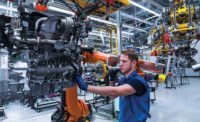Additive manufacturing is one of the hottest technologies to come along in the last 50 years. It uses three-dimensional printing to transform engineering design files into fully functional components created from glass, metal, plastic or sand.
Leading manufacturers, such as Boeing, Caterpillar, Ford, General Electric, General Motors, Sikorsky and Toyota, are using additive manufacturing to produce a wide variety of prototype parts layer by layer. The University of Louisville’s Rapid Prototyping Center (RPC) has been at the forefront of this technology for almost 20 years.
“We are a joint academic-industrial consortium providing access to world-leading capabilities in additive manufacturing via laser and electron beam powder bed processes for metals, plastics and ceramics,” says Tim Gornet, manager of RPC operations. “Members of the consortium range from Fortune 100 companies to individual inventors.
“[We aid manufacturers] in the entire product development process, including conceptual design, material selection, prototyping, tooling and production, [in addition to] applied and basic research,” adds Gomet. “Getting a quality product to market quickly is critical and correcting design flaws early in that process is essential. [Our] members have used [our facility to save time, money and costly delays in product development].”
In 1993, Louisville became the first U.S. university to buy and operate selective laser sintering equipment. Since then, RPC has funded research in all areas of additive manufacturing.
“This includes the fundamental understanding of the effect of process variables and properties, material development, and design for additive manufacturing and testing,” says Gomet. The RPC works with a broad range of industries, including automotive, aerospace, appliance, medical device and sporting good manufacturers.
As part of Louisville’s J.B. Speed School of Engineering, the Rapid Prototyping Center is equipped with the latest software for solid modeling and part design of new components, in addition to reverse engineering of existing parts. The 8,600-square-foot facility is capable of producing prototype parts and low-volume components using laser sintering, direct metal laser sintering, electron beam melting, ultrasonic consolidation, fused deposition modeling, 3D printing and stereolithography.
There are currently 20 people involved in various additive manufacturing initiatives. “This includes faculty, full-time professional staff, post-doctoral researchers, PhD and Masters students, and cooperative interns,” explains Gomet.
Faculty and staff have been focusing their attention on understanding the issues and challenges of additive manufacturing. “This includes research into the basic physics of the various processes, equipment and process monitoring improvements for closed-loop control feedback and more consistent performance, and advanced designs,” Gomet points out.
“Additive manufacturing can offer engineers far more than prototypes of components—the advantage of almost unlimited geometric flexibility,” claims Gomet. “This allows for parts consolidation to eliminate assembly operations, optimize design performance, and create advanced designs and products that cannot be produced by traditional manufacturing processes.”
Developing ideas and methodologies for engineers to think outside the realm of current manufacturing technologies is a key goal of the Rapid Prototyping Center. “[We] support research and development programs in additive manufacturing and provide student instruction in the application of state-of-the-art technologies,” says Gomet.
Additive manufacturing is an integral part of the curriculum in the mechanical engineering and industrial engineering departments at Louisville. According to Gomet, the RPC is used by students in almost all design courses and is required for Master’s theses and PhD dissertations. The RPC also supports student teams such as the Baja Buggy and SAE Formula competitions.
The University of Louisville offers a course on additive manufacturing and an advanced manufacturing processes course, which focuses heavily on the technology. In addition, additive manufacturing is taught in courses on machine design and product development.
Louisville is at the Forefront of Additive Manufacturing



